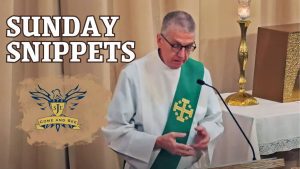
Deacon Dave Etters
Watch the Homily
Listen to the Homily
In this reflection for the Commemoration of the Faithful Departed (All Souls’ Day), Deacon Dave shares the Church’s timeless teaching on Purgatory, purification, and the hope of heaven. Discover how God’s refining love prepares our souls for eternal joy.
Read the Homily
Deacon Dave:
All Souls today, we also know specifically as the commemoration of all the faithful departed. The commemoration of all the faithful departed. And as Father Chaz mentioned, we have the Church Triumphant in Heaven, and they, of course, do not need our prayers. They’ve arrived. And we have Church Suffering, those who are being purified, Church Suffering. And then we have Church Militant, as we are a part of that Church. We’re fighting the good fight in this world.
I was years ago in a theology class, and we were talking about the end things, end times, and the things that were coming after this life. And someone, one of the students, raised a question to the instructor about purgatory. And the instructor shockingly said, “Do we still teach that in our Church?” Yeah, do we teach that? And it felt as though what was implied in that response was, “This is just, you know, purgatory is just some kind of a medieval superstition thing that we really have kind of dropped or something.”
But ah, no, no, no, it’s not true. We have embraced it. The Church has always taught that the purification of the souls would go on beyond this life if necessary. If necessary.
The Catechism states it clearly: All who die in God’s grace but still imperfectly purified are indeed assured of their eternal salvation. But after death, they undergo purification so as to achieve the holiness necessary to enter the joy of heaven. The Church gives the name Purgatory to this final purification of the elect, which is entirely different from the punishment of the damned.
Purgatory has sometimes been looked upon as a place, but actually it’s a process of cleansing and removing those things which are between us and God. It’s a reconciliation of our souls, and purification involves suffering—it’s hard to be purified.
Pope Benedict XVI, when he was a cardinal, Cardinal Ratzinger, said this: “Purgatory is not some kind of supra-worldly concentration camp where man is to undergo punishment. Rather, it is the inwardly necessary process of transformation in which a person becomes capable of Christ himself, capable of God, and thus capable of unity with the whole communion of saints.”
Contamination clouds the waters. Contamination of gold is dross, and silver, a dross—a contamination that robs the purity of the element. And when God spoke to his people in the Old Testament, he spoke to them clearly through the prophets, saying, “I refined them as one refines silver, and I will test them as one tests gold.”
And Malachi said, “He, God, will sit as a refiner and purifier of silver, and he will purify the sons of Levi and refine them like gold and silver.” But God looks at our lives, he looks at our souls, and he sees gold. He sees precious silver and gold, and he sees things in our life that are preventing us from being free and liberated.
It’s not as much—it is sin, of course, we all know that—we need to be purified and we need to shed the sins of our lives. But how many times do we really think about purifying our desires? Our desire should be God first above all for everything. Our heart, you know, first above all.
Total surrender, as Thérèse of Lisieux would say. And it’s that desire to become a saint that drives through the wiles and the winds of this world and the deception of the devil. God has called us to perfection in Christ.
And that purification to get us there—we come to Mass and we receive him in the Blessed Sacrament. We receive him—his very Body, Blood, Soul, and Divinity. And as we consume him, we become like him. We share and become partakers in the divine nature.
And as we pray in our personal prayer times, and as we turn our hearts to fasting and giving and all of the virtues that we have to avail ourselves of drawing close to God, he becomes central in our hearts. And our desires are changed from worldly things to heavenly things.
We must seek the things that are above. Of course, we keep our mind and our eyes open to the things that are in this world and around us, but our heart’s desire is for God alone. Saint Maximilian Kolbe said it this way: “Lord, I want to be a saint, and I want to be a great one.”
I think our desire is there, and I know in my own life there’s a cost to submit ourselves in this time here on this earth. There’s a great cost of seeking God alone and being purified. What will others think? I’ll be offensive. I might be persecuted. Yeah, that’s a part of it. But the value is so exceedingly greater.
This brief candle, this life, this little blip in time that we’re here on this great planet, is too short. There’s a scene in The Chosen series—the episode at the Wedding of Cana. Beautiful thing. They run out of wine, and Jesus is talking with Mary. And he’s reluctant to do something about it. He says, “Why is this my concern?”
And she looked at him, and she knew that this miracle needed to be performed—his first miracle that showed this sign of his divine Sonship to the world. And she said to him, “If not now, when?”